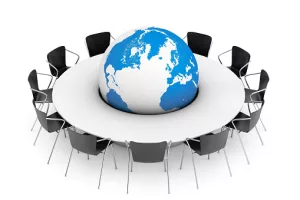“Educate individuals with a global mindset” was one of the opening phrases from IE University’s Provost Manuel Muñiz. On January 19, the unveiling of IE’s School of Global and Public Affairs new era was announced. The event titled “A New World (Dis)order: Politics, Economics, and Global Affairs as Tools to Confront Today’s Challenges” covered the challenges the world is facing currently and what the future holds specifically for the university. covered the challenges the world is facing currently and what the future holds specifically for the university.
Key speaker, Josep Burrel’s, insight into the most current pressing issues
The key speaker at the conference was Josep Burrel, the High Representative for the European Union for Foreign Affairs and Security Policy. Burrel began the talk with the “geopolitics of energy” and discussed the relevance of the topic in light of the Russian-Ukranian war. Europe is facing a shortage in means of receiving energy and has had to scramble to find other alternatives to Russian gas. As he stated, “Russia will pay a very high price for this war.”
To continue, Burrel discussed the looming technological battle. As he explained, Europe’s technological dependence on China is in fact far greater than its gas dependence on Russia. Considering this, other competitors must join the playing field. The Netherlands is now gaining importance with Advanced Semiconductor Materials Lithography (ASML). There is an ongoing battle to destroy the Chinese microchip industry, seeing as how they are the biggest manufacturer at the moment and may pose a threat to both Europe and the United States.
After Burrel gave his speech, a panel was moderated by Augusto Lopez-Claros, Chair of the Global Governance Forum. It included panelists: Jody Williams (Nobel Peace Prize Laureate), María Fernanda Espinosa (former President of the UN General Assembly and former Minister of Foreign Affairs of Ecuador) and Susana Malcorra, (former Minister of Foreign Affairs of Argentina and former Chief of Staff of the UN Secretary-General.)
Susana Malcorra’s explanation of the importance of cooperation between countries
Proposals were made by the panelists as to how to address global concerns and urgent matters. One of the opening remarks was made by Susana Malcorra. She stated how it would be interesting to explore a “crisis control model.” The pandemic showed that a global plan to tackle COVID-19 was necessary and that there needs to be a backup plan in case any event like that were to take place again in the future.
Malcorra was also asked whether she thought the European Union could serve as a potential template to be applied to the rest of the world. She responded by saying that the EU has set a baseline for how to reconstruct a new governance system. It could work elsewhere outside Europe, but the countries must exhibit a desire for integration.
How to understand the priorities of a country
The next speaker that followed was Jody Williams. She shared an observation regarding how all one has to do is examine a country’s budget to look at the country’s priorities. For example, in the United States, more than 57% of the discretionary budget goes to the military.
Rising up to the challenge and taking action
Climate change was also discussed, and to better understand the issues stemming from it, an analogy was provided by Maria Fernanda Espinosa. She explained how much like a fever is a symptom of an illness, climate change is a symptom of the dysfunctional relationship between state responsibility and the environment. In addition, she stated that more decisions need to be made to fund climate resilience. There are several countries that are already doing so such as Ecuador and New Zealand.
Espinosa also discussed the new agenda for peacemaking that is currently in the works. There are more than 30 armed conflicts in the world right now. She referred to how The Charter of the United Nations calls for help from citizens of the world. Every single person is a citizen of the world, and therefore, they should speak up, rise to the challenge and denounce what they do not agree with.
Finally, Espinosa was asked whether the veto power that the United Nations Security Council has is their “original sin.” She responded by saying how the sentiment for reform is growing and how not only the Security Council needs reform, but also the General Assembly. She stated that the procedure for decision-making needs to be amended and a new definition of sovereignty is necessary. Espinosa finished by saying that the world today demands creativity, audacity and intelligence.
As was highlighted by Provost Muñiz, “we must work now more than ever to address these challenges and be of service to others.”
Featured image by: Gabriela Gorodi







